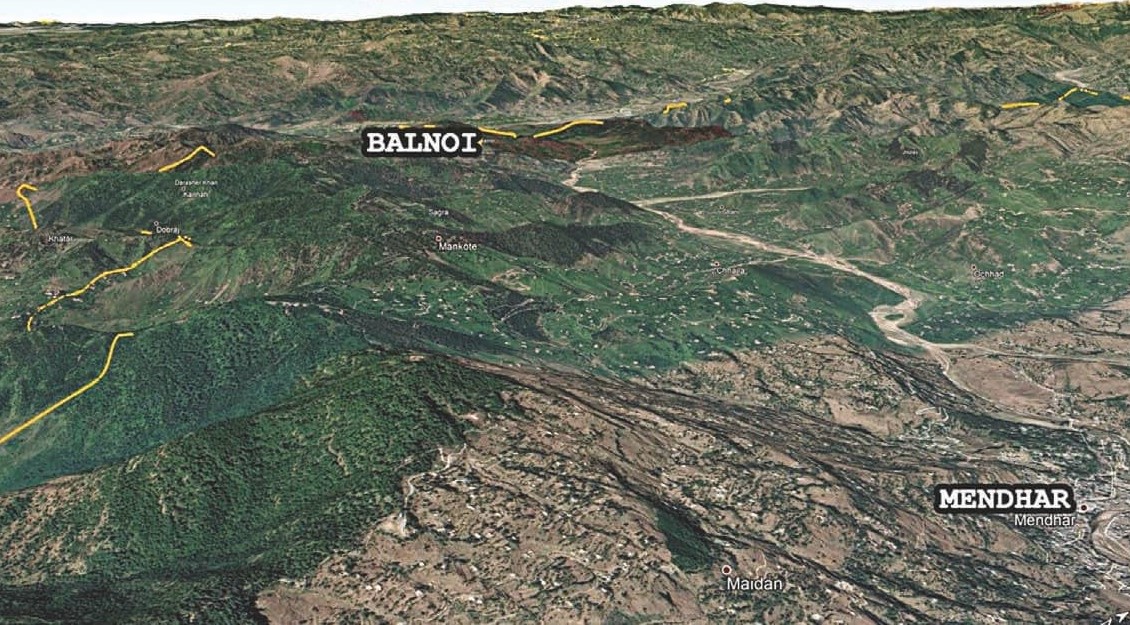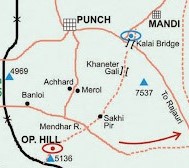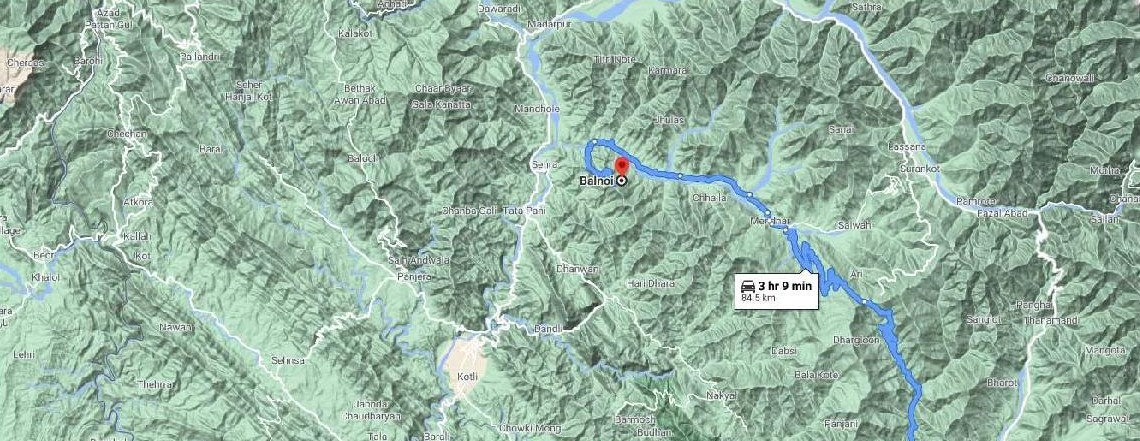
It is really intriguing as to How this myth of Islamic Superiority was created. The Pakistanis despite being superior in numbers and in equipment and occupying well fortified defenses on dominating heights on number of occasions in the Four Rounds that we have had , have barely managed to win a single battle.
Battle of OP Hill was one such battle where Pakistanis in 1965 were sitting pretty on a dominating piece of ground in well fortified defenses but still lost the position in just one night, despite the fact that defenders in mountains are always at a great advantage.
So in that sense, it goes to the credit of the Indian soldiers who toiled hard and defeated the enemy. Lt Gen Harbakhsh Singh (retd) described this battle as “one of the most spectacular battles of the 1965 and one of the toughest fought since Independence”.
This was a bloody battle full of acts of valour and heroic endeavour, fought ferociously by both sides, involving hand to hand combat, audacity , tremendous physical courage and sacrifice. The three battalions that took part in this battle lost 7 officers ,6 JCOs and 158 Jawans.
The Battle of OP Hill took place after the ceasefire on 23 September 1965. OP Hill was a Border Observation Post in the Bhimber Gali(BG)- Mendhar Sector, approx 20 km south west of Poonch. This Observation Post (OP) was being used by the Pakistanis to direct accurate artillery fire on the Road leading to Mendhar-Balnoi- Poonch. So, inorder to avoid isolation of Balnoi and Krishna Ghati, it was necessary to capture of OP Hill.


As Pakistan refused to vacate the feature despite the ceasefire having come into effect on 23 September, the capture of this position became necessary.
The Indians perhaps initially under estimated the strength and fortification of defenses at OP Hill and so the battalion level offensive launched by an infantry Battalion on 6 and 7 October 1965 failed.
It was then decided to launch a full-fledged brigade attack on 2 November 1965. This attack was launched by 120 Infantry Brigade which had three Infantry Batalions ; 5 Sikh Light Infantry, 2 Dogra and 7 Sikh.
Enemy Information.
The Pakistan army had a company strength deployed in a fortified and well coordinated defensive position at OP Hill. All the approaches leading to the top of the Hill were mined and had barbed wire obstacles, which were covered by well coordinated Machine gun fire and artillery fire..
Own Plan.
The attack was planned to be launched before midnight on 2 November 1965. The attack plan of 120 Infantry Brigade, that was tasked to evict the enemy from this strategic location was ;
Phase 1 ;The left shoulder of the Hill was to be captured by 5 SIKH LI and Right shoulder by 2 DOGRA.
Phase 2 ; 7 SIKH was to capture the centre portion of the feature, after the foothold is gained in Phase 1.
2 Dogra Plan. Lieutenant Colonel R K Mazumdar, Commanding Officer of 2 DOGRA worked out a detailed plan for his unit to capture the Objective given to him ; Right Shoulder. The unit’s main objective Right Shoulder was divided into Black Rock, and Twin Pimple.
Phase 1 ; One company with a Company in Reserve to capture the Black Rock.
Phase 2. Second company to capture Twin Pimple.
Action
As the Phase 1 company reached closer to the Objective ; Black Rock heavy artillery shelling and heavy machine gun fire and casualties stalled the momentum of the attack. The CO was with the leading company , realising the challenge, immediately pushed in the reserve company into the attack and regained the momentum of assault .
Without wastng any time and giving enemy which was offering stiff resistance to readjust/reorg his defenses, The Phase 2 Company was also launched into the assault to capture the Twin Pimple, Both companies succeeded in capturing their objectives by 0400 hours, suffering heavy casualties.
5 Sikh LI .
This battalion was new and its officers were very young, only one company commander had more than three years' service. As a result the Commanding Officer decided to personally lead the assault. The CO carried out an appreciation of the situation and realized that as the enemy is anticipating an attack the approaches to the feature must have been heavily mined and the enemy had a well coordinated defensive position, with its obstacles covered by artillery fire and automatic fire.
In such a situation, if the enemy is not taken by surprise there is a chance of suffering heavy casualties.
So, the CO inorder to achieve surprise, decided to take an approach which seemed to the enemy absolutely unlikely. This entailed climbing a steep cliff to reach the top of the feature, in which barely a section could climb together. This was a difficult task at night and could lead to heavy casualties and may also jeopordise the whole plan if the surprise is lost.
Hence the CO decided to send out a small patrol under a young Captain almost daily for a few nights to recce the route. This small patrol did its job with complete stealth and marked the route to the Left shoulder of the dominating feature by cutting the barks of pine trees. As it was a stiff climb , the leader of the patrol a Young Captain, tied ropes to the trees and also made markings on the trees so that on the night of the attack the assaulting company does not lose their way.
On the D day night, every thing depended on the factor ; SURPRISE. The Battalion took the difficult approach, climbed the cliff and surprised the enemy by attacking from an unexpected direction and so in a lightening move captured its objective. The CO having surprised the enemy decided to exploit the advantage and ordered the capture of more objectives which were assigned to another Battalion. The highest feature and the ground of tactical importance for the enemy was captured by midnight.
Subsequently, two more objectives were captured, in one night. The highlights of the attacks were the enthusiasm displayed by men, the surprise achieved and also the reading of the battle situation that enabled the CO to exploit the advantage and off course launching of additional attacks without waiting for orders from the Brigade Commander. Although, the enemy despite having been taken by surprise put up a very tough fight and each bunker had to be cleared after hand-to-hand fighting but the unit after gaining the initial surprise did not give any respite to the enemy.
For taking this spectacular initiative and for displaying conspicuous gallantry and inspiring leadership, the Commanding Officer (Lt Col. Sant Singh) was awarded MVC, the second highest gallantry award.
Casualties .
The ferocity of the battle can be easily gauged by the Heavy casualties suffered by the three units ; Seven Officers, 06 JCOs and 158 Jawans made the supreme sacrifice in this battle. Its therefore not surprising that the battle finally won by the troops of 120 Infantry Brigade after such heavy casualties must have happened due to some personal heroics of many individuals. Consequently 03 Maha Vir Chakras, 03 Vir Chakras, 13 Sena Medals and 11 COAS Commendations were awarded to its brave soldiers.
Few Heroes.
The outcome of such a bloody battle cannot be dictated by just handful of officers and men who got the awards surely, it was a team effort, wherein everyone who was part of this epic battle must have contributed and been proud of being part of it. Several examples of individual and collective acts of bravery are testimony to this fact, that one single battle could produce so many Galantry award winners, hence, it is necessary that a few inspiring incidents be mentioned
ONE. Captain Gautam Mubayi’s was truly a remarkable example of good leadership; leading from the front. During the assault when the leading company’s advance came to a halt due to enemy’s heavy fire. Capt Mubayi volunteered and crawled forward to cut the wire-mesh fences and led his platoon from the front through enemy minefield. A mine exploded fatally wounding him in the leg but he refused to be evacuated till the mission was accomplished. When his platoon was again pinned down by heavy gun fire, he charged ahead lobbing grenades to silence one of the two, enemy's Browning machine guns. Pakis kept up a relentless fire but the captain and his men unfazed, continued the assault. Eventually, a burst of machine gun fire hit him in the chest and Capt Mubayi succumbed to these injuries but his men, inspired by his courage, fought hand to hand for almost 6 hours before taking possession of OP Hill at 0400 hrs on Nov 3. Capt Gautam Mubayi was given the nation’s second highest gallantry award, “Maha Vir Chakra” for his outstanding bravery, unyielding fighting spirit, and sacrifice during the operation.
Two. Nk Darshan Singh. Darshan Singh displayed tremendous courage and sense of responsibility. He told his fellow soldiers that it didn’t matter if one person died as long as it created a path for others to attack and capture OP Hill. When the attack was launched on the midnight of November 2, Darshan Singh marched ahead through the minefield even after landmines had ripped off a leg and an arm. Unmindful of his wounds, he dragged himself forward to an enemy bunker and threw a grenade into it. Encouraged by his action, the few remaining men of his section charged and silenced the enemy Browning. He embraced martyrdom to make way for his fellow soldiers, who later cleared Pak bunkers in hand-to-hand fighting throughout the night. Naik Darshan Singh died shouting to the follow-up echelon to come by the route, which had been cleared of mines by the charge of his section. He made the supreme sacrifice of his life for the success of his company and displayed courage and devotion to duty of the highest order in the finest traditions of the Army.
Author. Col N Bhatnagar is an alumnus of NDA, Prestigious Def Services Staff College and XLRI. He served in Indian army as an Infantry Officer in all parts of the country and also in Srilanka and has also worked with Reputed Companies - Power, Hospitality and Health Care sector . He has also worked as a National Assesssor of CII for its CII-EXIM Bank Award and HR Excellence award. He has also authored Three Books.
Disclaimer. The views expressed are of Author.
